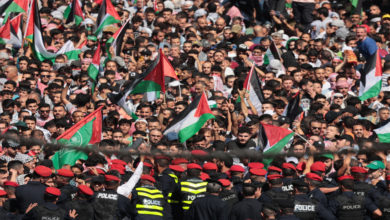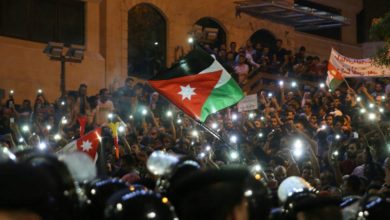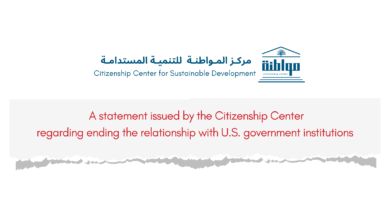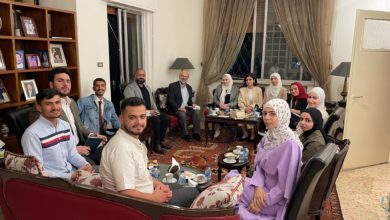Abdullah Jbour: Youth and the course of the revolution in the Arab countries

The year 2020 marks the tenth anniversary of the outbreak of the Arab uprising, whose first spark was sparked by the Tunisian young man, Mohamed Bouazizi, who set himself on fire as a response to the confiscation of his wares and the harassment and humiliation inflicted on him by a municipal official and her aides in the city of Sidi Bouzid, confiscating his vegetable cart. This incident was a catalyst for the Tunisian Revolution and the wider Arab Spring against autocratic regimes. Extending to Egypt, Libya, and Yemen. These revolutions were able to bring down the political regimes in many countries, while confrontations and wars broke out in other countries.
The protests in Algeria and Sudan, in a second wave at the end of the first decade, resulted in changing the existing political regimes in these countries. While protests are continuing so far in other Arab countries, especially in Lebanon and Iraq. The young people in these countries, in a new uncharacteristic protest speech, reject the continuing monopoly of the ruling political forces. They condemns also foreign interference in the two countries, mainly the political sectarian extension that divides the two countries and creates armed militias that negatively affect the social contracts of the state and destroys its national unity.
The Arab youth before the Arab Spring – concerning the general political affairs – was accused in a negative stereotype, of being an indifferent, weak, lost, and not qualified generation to adopt reformist political issues. Afterward, the Arab uprisings came to change this image, which forced political and social forces and the masses of intellectuals to recognize that the youth generations leading the masses of protesters in the squares, and directing public opinion on social media platforms, is the voice of change and hope. This voice is the most courageous, powerful, and influential generation of its predecessors, and consequently, the social and political components followed them and obeyed their path, and accompanied them in the fields throughout the past decade.
The young generation and political disappointment
The positive image of the young generation is still present in the mindset of the Arab society, but it differs in the mentality of political forces, especially those forces that took over the results of revolutions and protests. Also, these forces see the youth as a political opponent that threatens their political agendas. Accordingly, it was in its interest to exclude the young generation on the first day after the revolutions, to keep it from being present in political decision-making areas, and to prevent its attempts to organize itself politically, in an attempt to transform the energy of this generation into social and economic side issues seeking to control and monopolies the power.
Huntington – whose theory of “domino effects” was proven in the Arab revolutions – explains the importance of realizing modernization stating: “The more societies develop, the more they become more complex. If the process of social modernization that creates this disorder is not synonymous with a political and institutional modernization process, which is the process that produces political institutions capable of managing modernization, the result is the growth of violence”. Therefore, the democratic transition fails in societies that are experiencing a state of political change when they realize the importance of democratic modernization and the political challenge that integrates new generations into making democracy according to what is referred to as “Intergenerationality”.
Observers see the Tunisian experience, despite the political forces excluding the Tunisian youth from being present in decision-making areas, as a practical example in achieving the conditions for a democratic transition. The young generation refuses this exclusion- especially those who contributed to changing the political regime. This young generation faced and punished the political forces in Tunisia by its boycott of the parliamentary elections, its sudden participation in the presidential elections in early 2019, and the contribution to elect a new Tunisian president from outside the list of recognized names. Thus, starting a new path of a young general denial of the forces that form the political scene. Accordingly, we started to witness a practical application of the theory of ‘Contagion’ and ‘Political and Economic Conditionality’ in the democratic transition, through the events of change in the political regimes of Algeria and Sudan after a wide and stubborn youth participation that had fallen into abandonment for more than 7 years from the first decade of the Arab revolutions.
The protests moved quickly from North Africa to the Middle East, specifically in Lebanon and Iraq. The youth in these two countries also adopted the slogan of collective removal and public denial of “all means all” and “we want a homeland” in a reflection of the lack of confidence that young people live with state institutions. The young generations in these two countries adopted a new discourse, more boldly, that rejects sectarian and external interference in political affairs and the role of the so-called third-party in the accumulation of corruption. The protests are still present in the Lebanese street at the end of the first decade of the Arab revolutions, while the governorates of Southern Iraq are still embracing youth and civil society protests despite the harassment by militias and religious armed groups.
For Arab youth, the protests and uprisings are not over yet. Moreover, worsening economic conditions, political exclusion, and social marginalization are real motives for protesting again, especially in light of the rise of authoritarianism with the spread of the Covid-19 epidemic, which some Arab regimes exploited to punish their critics and crackdown on their opponents. This creates a fertile ground for more violent protests that reject decorative and formal changes that are no longer working in the eyes of young generations.
Abdullah Jbour, CEO of Citizenship Center in Jordan, a researcher at Politics and Society Institute. His research focuses on youth and democratization, citizenship, and civil society.





